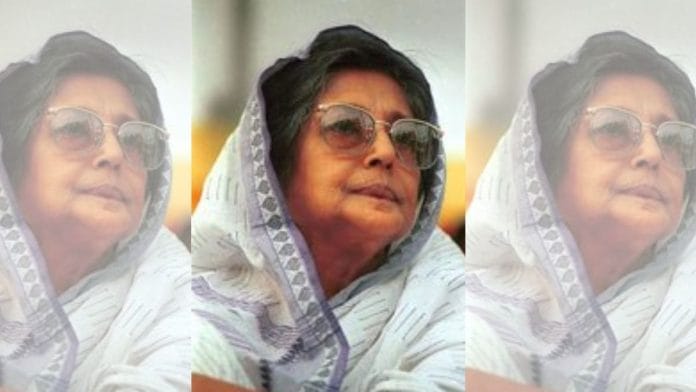On the morning of 23 March 1971, Dhaka erupted as thousands of Bangladeshis took to the streets rejecting Pakistan’s National Day with chants of ‘Joy Bangla, Banglar Joy ‘, Long live Bengal, glory to Bengal. It was a declaration of war. Among the protesters, in the sea of black flags of resistance alongside the green and red flags of Bangladesh, was Jahanara Imam — waving the flag of liberation from her rooftop.
“Today is the day of resistance. Early in the morning, all of us in the house went to the rooftop and raised the new flag of independent Bangladesh next to the black flag. I felt a tickling in my chest,” Jahanara Imam wrote in her diary.
This fervour to see her country independent of Pakistan and the fight for justice against war crimes defined Imam, who came to be called Shaheed Janani or mother of martyrs.
Imam—whose 43rd death anniversary will be marked on 26 June 2024—was no short of a pulverising force of justice both during and after the Liberation War.
Losing her son to war
Imam documented the brutal and violent events during the tumultuous months between March and December 1971 in her diary, which was later published as Ekattorer Dinguli (Days of 71). The atrocities and massacres that swept through Bangladesh during this period were painfully personal for her. Her elder son Shafi Imam Rumi, who joined the liberation war, was picked up by the Pakistani Army and disappeared. Her husband and younger son were interrogated and tortured as well.
Rumi appears multiple times in Ekattorer Dinguli, which was translated into English by Mustafizur Rahman (Of Blood and Fire). It remains one of the most crucial historico-literary documents of the war, all the more poignant in its intersection of the personal with the national.
According to professor and author Debali Mookerjea-Leonard, Imam in her 21 April entry recalls the moment she allowed Rumi to join the Mukti Bahini (Bangladesh Forces). After repeatedly denying his requests and reminding him of his plans to start college abroad that September, Rumi turns her refusal into a moral issue — not participating in the war would haunt his conscience forever. “I shut my eyes tightly and said, ‘Alright, I concede. I sacrifice you to the country. Go, enroll in the war’,” Imam wrote. And with that, the entry ends.
In another entry, she wrote how he and his friends successfully attacked Pakistani soldiers from a Morris Oxford and escaped. Everyone celebrated until a Captain Quayyum came knocking at the family’s door. She wrote that he looked like a “student, pale, slim and with a soft voice“. Her husband and her younger son Jami were also taken away. They return, but Rumi never does. Her husband Sharif died of a heart attack shortly before the war ended.
“When locked up, you often could not say whether it was night or day, or what time it was. You usually did not see the sun or the stars,” her younger son, Jami, later said in an interview with The Daily Star.
To maintain the historical accuracy of the guerilla operations, wrote Mookerjea-Leonard, Imam fact-checked using 80 audio tapes of interviews she had with Rumi’s surviving cohorts of the Mukti Bahini. In later interviews, she admitted that there were huge risks in writing about the details of guerilla operations amid the Liberation War. She had to adopt different strategies to conceal them — daily logs of seemingly irrelevant, trivial details to give the impression that her journal was nothing more than the ramblings of a bored housewife.
Soldiers’ identities were hidden and operational details were often written in geometric patterns or in code—six sarees in place of six rifles. There are also accounts that to mask her journal as seemingly unserious, she wrote using pens with inks of different colours.
Imam’s diary is a chronicled testimony of a woman who lived through war and then, independence.
After the Liberation War of 1971, Imam turned her attention to justice for the thousands of Bangladeshis who were killed.
Best known for her efforts to bring those accused of committing war crimes in the Bangladesh Liberation War to trial, she also convened the Ekattorer Ghatak Dalal Nirmul Committee with the aim of demanding trials for war criminals. In 1992, the committee established the Gono Adalat or People’s Court to hold public mock trials of those accused of war crimes.
Also read: Mamukkoya’s legacy more than Malayalam movie memes. His secular politics a shining light
Leader of the masses
Imam was born on 3 May 1929 in Murshidabad, West Bengal. After the Partition, Imam moved to erstwhile East Pakistan and taught at Vidyamoyee Government Girls High School. Soon after, in 1948, she married Shariful Alam Imam Ahmed, a civil engineer. They settled in Dhaka and she joined Siddheswari Girls School as Head Mistress. It is widely acknowledged that Imam single-handedly transformed the school into one of Dhaka’s best.
She was allegedly the only person who could command Sheikh Hasina. If Imam were to call the prime minister up and say that she needed help, Hasina would listen.
But it wasn’t just the authorities—Imam was a leader of the masses. A single summon from her could rally all factions supporting the Liberation War to her doorstep. Groups and individuals with opposing views would unite under her banner.
Imam’s charisma—despite lacking formal organisational or political roles—was so powerful that it unified half a million people under her leadership for a single cause.
She may not have picked up a rifle, but she made sure to raise an entire battalion against those who aimed their oppression at her people.
(Edited by Theres Sudeep)






